| Srl | Item |
| 1 |
ID:
148781
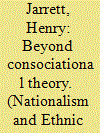

|
|
|
|
|
| Summary/Abstract |
This article analyzes the potential for consociational power sharing to pave the way for the formation of a shared identity in divided societies. It compares consociational arrangements in Northern Ireland and Brussels and argues that if this is achievable it will be demonstrated in the more liberal case of the former, rather than the corporate case of the latter. In concluding that greater intergroup engagement is occurring in Brussels than in Northern Ireland, this article challenges the ability of consociationalism to mitigate identities and looks to other factors to explain this finding.
|
|
|
|
|
|
|
|
|
|
|
|
|
|
|
|
| 2 |
ID:
148783
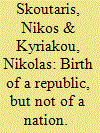

|
|
|
|
|
| Summary/Abstract |
The principle of bicommunality has been advanced as a founding feature of state-building in Cyprus. The aim of this article is to provide a systematic account of the different variations of the bicommunal principle enshrined in the Constitution of the Republic of Cyprus and in the Annan Plan as the most comprehensive proposal for the reunification of the island. In order to achieve its scope, the article focuses on the provisions concerning state institutions and citizenship. It argues that, in all those constitutional structures, state-building is not linked with nation-building. In fact, the acceptance of bicommunalism as a fundamental principle of the united Cyprus proves that the main concern has been the accommodation of the political tensions resulting from a divided society.
|
|
|
|
|
|
|
|
|
|
|
|
|
|
|
|
| 3 |
ID:
148779
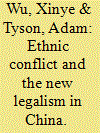

|
|
|
|
|
| Summary/Abstract |
In October 2014, the Chinese Communist Party committed to the establishment of a “socialist rule of law with Chinese characteristics.” Since then a group of Chinese political elites that we refer to as new legalists has been calling for ethnic conflict to be managed in accordance with the rule of law. This article finds that the deeply embedded and highly politicized problem of ethnic conflict in China lends credence to the legalist position that new law-based approaches are needed, although a number of practical problems arise when attempting to strengthen the rule of law. There are for instance powerful factions in the country supporting the continuation of repressive policies or selective ethnic preferentialism, and there are relatively low levels of legal awareness in ethnic-minority communities and general inadequacies in the Chinese legal system. We argue that an elite group of new legalists in China is attempting to reshape ethnic-minority policy in order to break free from the everyday protean politics of ethnic relations that is based largely on a negative cycle of violent confrontation and financial compensation.
|
|
|
|
|
|
|
|
|
|
|
|
|
|
|
|
| 4 |
ID:
148782
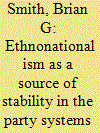

|
|
|
|
|
| Summary/Abstract |
Democratization, economic transformation, and EU accession have shaped the Bulgarian and Romanian party systems in ways similar to that seen across the rest of eastern Europe. A quarter century after democratization, the party systems remain unstable. The article demonstrates that nationalism and ethnic identity provide stable voter salience in party systems that remain dominated by fragmentation, personalistic political parties, and a lack of issue differentiation. An analysis of the use of ethnonationalism by political elites in Bulgaria is contrasted with a briefer analysis of Romania.
|
|
|
|
|
|
|
|
|
|
|
|
|
|
|
|
| 5 |
ID:
148784
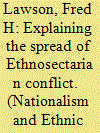

|
|
|
|
|
| Summary/Abstract |
Ethnic civil wars tend to spread to adjacent countries, yet the processes whereby diffusion takes place remain obscure. Quantitative studies point to a wide range of factors and dynamics that drive ethnosectarian conflicts across international borders with no consensus regarding the causal potency of these variables or the ways in which they interact with one another. Surveying the most influential theories that have been advanced so far clarifies the logic of disparate arguments and offers hypotheses that can be tested against particular cases. The civil war in Syria represents one notable instance in which fighting along ethnosectarian lines provoked a revival of political violence in a neighboring state, the Turkish Republic. Applying existing theories to this empirical case clarifies promising directions for future research.
|
|
|
|
|
|
|
|
|
|
|
|
|
|
|
|
| 6 |
ID:
148780


|
|
|
|
|
| Summary/Abstract |
The granting of amnesties has now become a cornerstone of peacebuilding efforts in societies emerging from conflict. Yet, the impact of the role of religion and ethnicity in determining attitudes towards such arrangements has not been empirically assessed. Mindful of this omission, this article investigates the relationship between a range of religious measures — religious practices and beliefs in and about God — and ethnonationalist identity on public attitudes toward amnesty in Northern Ireland. Based on nationally representative survey data, the results suggest that, although Protestants are significantly more opposed to such an initiative than Catholics, both religious beliefs and ethnonational identity are significant, albeit divergent, net predictors with respect to their differing views.
|
|
|
|
|
|
|
|
|
|
|
|
|
|
|
|